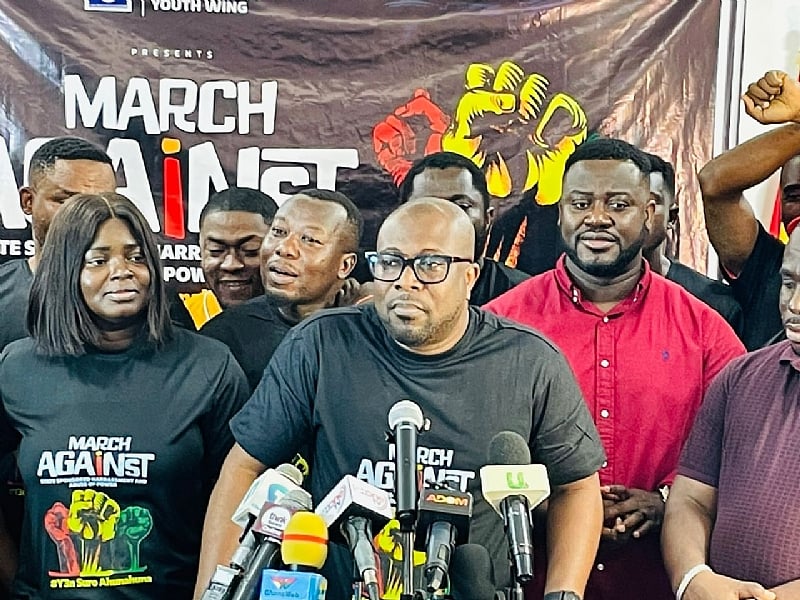The New Patriotic Party (NPP), Ghana’s main opposition party, is gearing up for a major demonstration on September 23, 2025, under the banner “Yɛn Suro Ahunahuna” (We Fear Human Beings). This protest is a direct response to what the NPP perceives as escalating abuse of power and selective justice by the ruling Mahama-led administration. The NPP alleges a calculated strategy by the government to employ state institutions, particularly the Ghana Police Service and the Economic and Organised Crime Office (EOCO), to intimidate and silence dissenting voices. This perceived weaponization of state power against political opponents has created a tense political climate and fueled the NPP’s decision to take to the streets. The party’s youth wing, spearheaded by National Youth Organizer Salam Mustapha, is at the forefront of this mobilization effort.
The core of the NPP’s grievances lies in the government’s alleged targeting of opposition figures through arrests, detentions, and investigations, which they believe are politically motivated. Recent instances involving the arrest of prominent NPP members, including Bono Regional Chairman Kwame Baffoe (Abronye DC) and various social media activists, have served as catalysts for the growing discontent within the party. These arrests, coupled with what the NPP sees as a deliberate pattern of denying bail to opposition members, have reinforced their conviction that the government is manipulating the justice system for political gain. The NPP argues that this selective application of the law undermines the principles of fairness and equality, creating a two-tiered system where government supporters enjoy impunity while opposition members face persecution.
Adding fuel to the fire is the perceived preferential treatment afforded to pro-government figures. The NPP points to the case of social commentator Kelvin Taylor, who was granted bail after his arrest, as a prime example of this alleged double standard. Salam Mustapha explicitly accused the government of sponsoring Kelvin Taylor’s return to Ghana and providing him with protection and escort to court. This perceived disparity in treatment has further incensed the NPP, solidifying their claim that the government is engaged in a deliberate campaign to suppress dissent and silence critical voices. They argue that this selective application of the law not only erodes public trust in the justice system but also creates a chilling effect on freedom of expression.
The planned demonstration is strategically designed to maximize impact and visibility. The march will commence at Obra Spot, a significant landmark in Accra, at 6:00 a.m. on September 23rd. From there, the protesters will proceed to the Police Headquarters to present a petition to the Inspector General of Police (IGP). This symbolic act aims to directly confront the police force, which the NPP accuses of being a tool of political repression. The demonstration will culminate at Jubilee House, the seat of the presidency, where a petition will be delivered to the Office of the President. This final act underscores the seriousness of the NPP’s concerns and their determination to hold the highest office accountable.
The presence of senior NPP leaders, including the Minority Leader and the entire minority caucus in parliament, alongside the youth wing, signifies the party’s unified stance against the perceived injustices. This show of solidarity underscores the gravity of the situation and the party’s commitment to challenging what they view as an assault on democratic principles. The petitions to be presented to the IGP and the President outline the NPP’s key demands and concerns. They call for an immediate cessation of what they term politically motivated harassment of opposition figures, including arrests, remands, and investigations. Furthermore, they demand an end to the alleged practice of denying bail to opposition members and an impartial application of the law, regardless of political affiliation.
The “Yɛn Suro Ahunahuna” demonstration represents a significant escalation in the ongoing political tension in Ghana. The NPP’s decision to take to the streets reflects their deep-seated frustration with what they perceive as a systematic erosion of democratic norms and the rule of law. The protest is not merely a demonstration of dissent but a calculated move to exert pressure on the government to address their concerns and restore public trust in the fairness and impartiality of state institutions. Salam Mustapha’s assertion that the youth will not be intimidated underscores the NPP’s resolve to stand firm in their fight against what they consider an oppressive regime. The demonstration’s outcome and the government’s response will undoubtedly shape the political landscape in the lead-up to future elections and have far-reaching implications for Ghana’s democracy.














